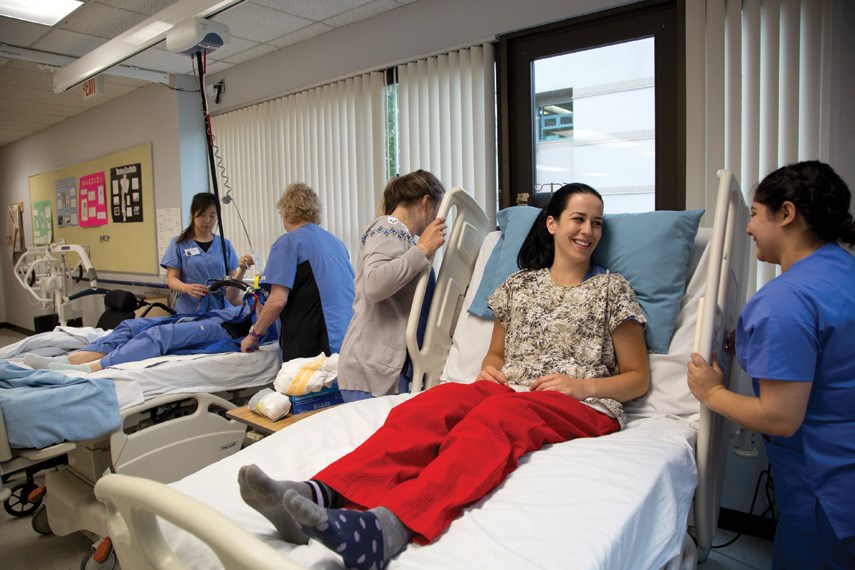As the leaves begin to turn and an end-of-summer chill fills the August air, many students are packing their bags to head to post-secondary institutions in other provinces or countries.
Others are staying right here in North Vancouver, where they have enrolled in one of the many innovative programs offered at Capilano University.
Since receiving its university designation in 2008, Capilano University has added an array of cutting-edge programs to its roster, and there are more to come, says the school’s spokeswoman, Cheryl Rossi.
One in particular is the partnership between the Health Care Assistant Program at Capilano University and Squamish Nation’s Eslha7an Learning Centre. Heading into its pilot year, the eight-month certificate program prepares Aboriginal students to provide personal care to patients and residents in the community, including those in complex care, in specialized dementia care and in acute care settings.
“We know that the need for qualified health-care providers is increasing dramatically,” says Nadja Neubauer, co-ordinator of the Health Care Assistant Program.
“At the same time, Aboriginal professionals are sorely underrepresented in health care. When considering our strong commitment to Truth and Reconciliation, we recognized that our program could play a part in increasing the number of Aboriginal health-care assistants. That idea was the spark that led to a partnership between our program and the Squamish Nation’s Eslha7an Learning Centre.”
The program drew on the expertise and experience of Tracy Mitchell, manager of Training and Trades with the Squamish Nation as well as Lisa Paull, the Squamish Nation’s post-secondary student advocate.
“We applied for funding from the provincial government and were awarded (it) very early on this summer,” says Neubauer.
The result is a curriculum designed to encompass theory and clinical practice.
“We will be delivering our provincial curriculum but will be doing so with an Indigenous focus that will include cultural activities … . A lot of the (program’s) teachings are done through storytelling and we will ensure that those stories have an Indigenous focus,” says Neubauer. Indigenous instructors, or those with experience working with Aboriginal populations, will also be hired when possible.
Unlike Capilano University’s original Health Assistant Care Program which has been running for a number of years, in this partnership program the majority of classroom courses will be held at the Squamish Nation’s Eslha7an Learning Centre which offers courses, programs and workshops to members of the Squamish Nation as well as all Aboriginal Peoples living in North and West Vancouver.
“This is intended not only to remove some of the barriers that may make attending classes on campus challenging for Aboriginal students, but also to provide easy access to programs, support, and guidance from the students’ community,” says Neubauer.
This is not the only pilot program at Capilano University geared towards Aboriginal students.
The University One for Aboriginal Learner’s Certificate is a one-year preparatory program for Aboriginal students planning to enrol in post-secondary education.
“I’ve worked in education since the 1990s and our Aboriginal youth have struggled in both K-12 and post-secondary education, so this is an opportunity for Capilano University to look at how we can better support Aboriginal learners in pursuing their post-secondary education allowing for them to see success in post-secondary,” says David Kirk, First Nations advisor at Capilano University.
The result is a program that develops core academic skills while supporting knowledge of Aboriginal culture.
“We will also have elders involved in the program with the students, plus we have some cultural activities built into the program and all of the course material wherever possible we will use Indigenous material,” says Kirk.
Another one of CapU’s notable programs is its five-year-old North American and International Management Graduate Diploma.
The one-year full-time course is designed for students who have recently completed an undergraduate degree in business, tourism or communications, and provides students with two credentials: a graduate diploma in North American & International Management from Capilano University and a Master of Science in International Business from the University of Hertfordshire.
The unique program has students completing one semester at Capilano University, a second at the University of Hertfordshire in the U.K., and a third writing a final research paper or business case.
The dual-degree provides students with valuable cultural experience while giving them a competitive advantage in the global marketplace.
“In addition to obtaining two credentials in only one year of study, students develop an international network and a global perspective on business that can greatly expand their career opportunities both domestically and abroad,” says Halia Valladares, a Capilano University dean in the faculty of Business and Professional Studies.
Valladares says that many of the 70 students who have graduated from the program have gone on to find fulfilling full-time employment, sometimes within months of graduation.
“Our graduates are currently pursuing a wide range of careers from marketing manager for an international tech company to senior supply chain business analyst for a global pharmaceuticals company to analyst of global liquidity cash management at an international bank,” she says.
Unlike many other graduate programs, the International Management Graduate Program requires no work experience or GMAT score; students can enroll directly upon completion of their undergraduate degree.



